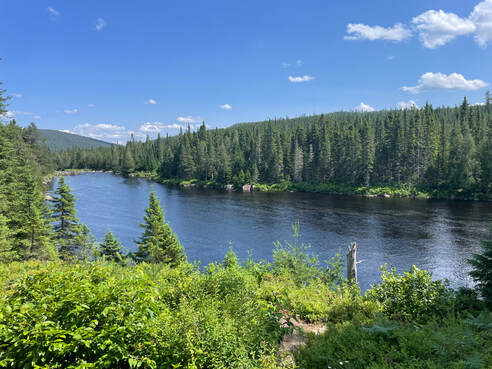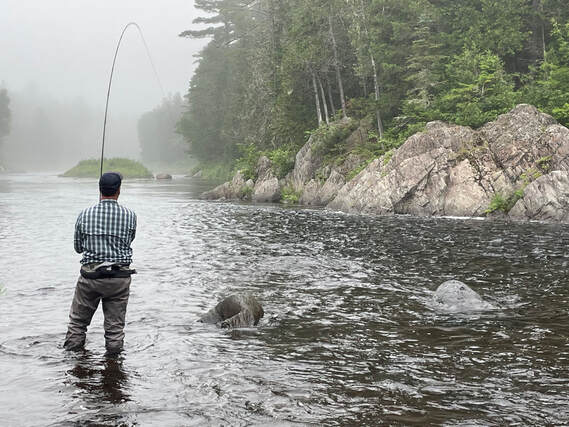Legacy effects of past pesticide application on benthic invertebrate communities

(Group Leaders: Dr. Christopher Edge (Natural Resources Canada – Canadian Forest Service), Dr. Josh Kurek (Mount Allison University), Dr. Jennifer Lento (University of New Brunswick – Canadian Rivers Institute), and Dr. Karen Kidd (McMaster University)
Date of Working Group: November 6-10, 2023
In person location: Upper Oxbow, Miramichi, New Brunswick
Deadline: Aug 30, 2023
Apply here: closed
The Canadian Institute of Ecology and Evolution, as part of its NSERC-CREATE Living Data Project, is now accepting applications for graduate students who wish to participate in a working group. Students will gain valuable experience in synthesis science, have the opportunity to co-author publications, and may be eligible for two course credits. Students must be currently registered in a graduate program in ecology, environmental science, evolution or a related discipline at McGill University, University of British Columbia, University of Regina, or Université de Montréal. The highest priority will go to students who have already taken the Living Data project courses “Synthesis statistics for ecology and evolution” and “Scientific collaboration in ecology and evolution” or who are registered to take these courses in fall 2023. Together with these two courses, participation in this working group will fulfil most of the requirements for a CIEE Certificate in Synthetic and Collaborative Science. Students who have participated in a previous Living Data Project working group are ineligible.
Project Description:
The broadscale use of pesticides began in the 1950s when there was limited knowledge of their negative environmental consequences. These chemicals were used for decades on large tracts of land before their non-target effects, persistence, and negative environmental consequences were recognized and their use was restricted or banned. Today, the acute environmental effects of historically used pesticides are well documented. However, fundamental ecological questions about community recovery, legacy impacts, and change post disturbance remain unanswered as highlighted by the United Nations Decade on Ecosystem Restoration 2021-2030.
A well-known example is the application of pesticides to the forests of New Brunswick for the control of spruce budworm. From 1952-1993 at least one, and up to 40, pesticide applications were made to 97% of the province’s forests (6,200,000 ha). Several of these pesticides are toxic to aquatic life, especially aquatic macroinvertebrates, a taxa commonly used as indicators of ecosystem health. In New Brunswick there is a publicly available dataset of modern benthic invertebrate communities from the Canadian Aquatic Biomonitoring Network (CABIN) that matches the spatial extent of the historical pesticide applications. Together the pesticide and CABIN datasets provide a novel opportunity to examine ecosystem recovery and legacy impacts of historical pesticide application to aquatic ecosystems.
In this working group, participants will meet to define and develop 2-3 interdisciplinary subprojects such as: 1) identifying criteria used to assess ecosystem recovery, 2) developing powerful methods to evaluate cumulative legacy effects of multiple pesticides, and/or 3) assessing environmental factors driving community recovery in the Anthropocene.
Date of Working Group: November 6-10, 2023
In person location: Upper Oxbow, Miramichi, New Brunswick
Deadline: Aug 30, 2023
Apply here: closed
The Canadian Institute of Ecology and Evolution, as part of its NSERC-CREATE Living Data Project, is now accepting applications for graduate students who wish to participate in a working group. Students will gain valuable experience in synthesis science, have the opportunity to co-author publications, and may be eligible for two course credits. Students must be currently registered in a graduate program in ecology, environmental science, evolution or a related discipline at McGill University, University of British Columbia, University of Regina, or Université de Montréal. The highest priority will go to students who have already taken the Living Data project courses “Synthesis statistics for ecology and evolution” and “Scientific collaboration in ecology and evolution” or who are registered to take these courses in fall 2023. Together with these two courses, participation in this working group will fulfil most of the requirements for a CIEE Certificate in Synthetic and Collaborative Science. Students who have participated in a previous Living Data Project working group are ineligible.
Project Description:
The broadscale use of pesticides began in the 1950s when there was limited knowledge of their negative environmental consequences. These chemicals were used for decades on large tracts of land before their non-target effects, persistence, and negative environmental consequences were recognized and their use was restricted or banned. Today, the acute environmental effects of historically used pesticides are well documented. However, fundamental ecological questions about community recovery, legacy impacts, and change post disturbance remain unanswered as highlighted by the United Nations Decade on Ecosystem Restoration 2021-2030.
A well-known example is the application of pesticides to the forests of New Brunswick for the control of spruce budworm. From 1952-1993 at least one, and up to 40, pesticide applications were made to 97% of the province’s forests (6,200,000 ha). Several of these pesticides are toxic to aquatic life, especially aquatic macroinvertebrates, a taxa commonly used as indicators of ecosystem health. In New Brunswick there is a publicly available dataset of modern benthic invertebrate communities from the Canadian Aquatic Biomonitoring Network (CABIN) that matches the spatial extent of the historical pesticide applications. Together the pesticide and CABIN datasets provide a novel opportunity to examine ecosystem recovery and legacy impacts of historical pesticide application to aquatic ecosystems.
In this working group, participants will meet to define and develop 2-3 interdisciplinary subprojects such as: 1) identifying criteria used to assess ecosystem recovery, 2) developing powerful methods to evaluate cumulative legacy effects of multiple pesticides, and/or 3) assessing environmental factors driving community recovery in the Anthropocene.


